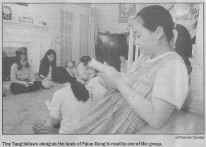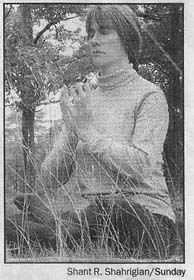Free from persecution, area Falun Gong practitioners struggle to expose China's bloody secret
Followers flee persecution to keep their faith
Vol 2, No. 29
July 20, 2003
By Shant R. Shahrigian
Sunday staff writer
 Safe in her Beijing home, Jinglu Xu could see the nighttime killings of the 1989 Tiananmen Square
massacre by the light of Chinese soldiers' gunfire. Xu, then 13 years old, watched the scene through
her father's military telescope.
Safe in her Beijing home, Jinglu Xu could see the nighttime killings of the 1989 Tiananmen Square
massacre by the light of Chinese soldiers' gunfire. Xu, then 13 years old, watched the scene through
her father's military telescope.
It was one of the last times she would view her homeland through a Chinese government-approved lens.
"I was so young and had no idea of politics," she said. "I just kept questioning to my father, 'Why?' "
Xu, now a Fairfax City resident, came to view the actions of her native country's communist government - from the 1989 shootings of an unknown number of student protesters and bystanders, to persecution of her fellow Falun Gong practitioners today - as similar reflections of a brutal attitude toward deviation from the status quo.
After the Chinese government attempted to conceal the Tiananmen Square massacre from its citizens, "I was confused," she said. "But when the persecution of Falun Gong started, I understood."
"Peaceful people"
 Xu, 29, came to the United States in April 2000 to escape the persecution she and her family
suffered for practicing Falun Gong. Also known as Falun Dafa, Falun Gong is an ancient Chinese
spiritual practice introduced to the public in 1992 after centuries of secrecy.
Xu, 29, came to the United States in April 2000 to escape the persecution she and her family
suffered for practicing Falun Gong. Also known as Falun Dafa, Falun Gong is an ancient Chinese
spiritual practice introduced to the public in 1992 after centuries of secrecy.
Centered around exercises, meditation and teachings for spiritual improvement, the practice had gained millions of followers in China when practitioners' peaceful protests catalyzed a government crackdown on Falun Gong in June 1999.
Falun Gong adherents say the crackdown was caused by government paranoia over the fact there were more practitioners than registered communists in China at the time.
"Falun Gong practitioners are peaceful people," Xu said. "Within the past seven years, people know that ... even people working in communism."
Since the crackdown began, the Chinese government has executed more than 1,000 practitioners and detained tens of thousands more, according to Amnesty International. The human rights group has acknowledged the likelihood of unaccounted instances of imprisonment, torture and execution.
[...]
Raising awareness
Xu is one of many Metro-area Falun Gong practitioners who regularly protest the Chinese government's treatment of their fellow adherents. Falun Gong does not have a formal organizational structure - followers practice in private or in small groups - but people come together in large numbers to rally for the right to practice in China.
"There's a loose organization in that those who practice know those who practice, in the sense that those who jog know those who jog and say 'Let's get together and jog in Rock Creek Park,' "said Washington practitioner Keith Ware.
Vienna resident Tiny Tang, who often helps organize local Falun Gong activities, estimates there are up to 500 practitioners in Northern Virginia.
On June 17, about 40 of them rallied at Freedom Plaza in Washington in support of a lawsuit against former Chinese president Jiang Zemin, which accuses him of genocide, torture and other human rights violations.
A week earlier, about 80 area practitioners joined 1,000 of their peers from around the globe for a similar rally in Chicago, where the suit was filed.
"We don't care who's in power," Ware said, "We are focused on one thing only: ending the persecution in China. ... A politician would never hear a Falun Gong practitioner unless they were being beaten and tortured and killed."
In addition to participating in rallies, local practitioners regularly meditate and exercise near the Chinese Embassy in Washington to protest and raise awareness of the Chinese government's Falun Gong policy. Sometimes there are no protesters, but often, at least one can be seen on the lawn across from the embassy. On weekends, dozens of practitioners gather on the same lawn.
"The atmosphere is quiet, it's friendly. We're not a rowdy bunch," said Kery Loki Nunez of Annandale."
Falun Gong practitioners do not need to be raucous to convey their message: The sight of them simply meditating and exercising - acts which would lead to beatings or worse in China -just yards away from representatives of the government responsible for those beatings is striking.
Though embassy officials rarely interact with the protesters, passersby on Connecticut Avenue sometimes stop to speak with them and drivers occasionally honk in support.
"We kind of feel like, the more people know about the situation, the less it will last," said Falls Church practitioner Barbara Phillips.
The worldly monk
Falun Gong can be difficult to grasp from a Western point of view, Phillips said. "In our culture, there's nothing to compare it to."
She compared a Falun Gong practitioner to a Christian monk, in that both renounce worldly pursuits for the spiritual. But whereas the monk does so in isolation, his counterpart remains engaged in day-to-day life.
"This environment is so complex, it really makes us improve stronger and faster," Phillips said.
Ware described Falun Gong in terms of an old proverb.
"Everybody's heard of 'what goes around, comes around,'" he said. Falun Gong "is a very real, deep understanding of that."
Ware added that this example is "a superficial understanding" and those who want to fully understand Falun Gong must read its main text, "Zhuan Falun."
Nunez practices both Christianity and Falun Gong.
"I think they have a lot of consistencies in terms of some of the beliefs," she said. "They both have similar goals."
After Nunez started to practice Falun Gong, she struck up a friendship with a homeless woman. Nunez said she would not have previously sought that friendship.
"I feel like I care more about people." She said. "Truthfulness, Compassion, that's really hard to achieve."
Those two concepts, as well as forbearance, form the foundation of Falun Gong, which translates as "law wheel qigong." There are different varieties of qigong, a cultivation practice similar to Falun Gong. "Zhuan Falun" means "turning the law wheel."
Adherents described Falun Gong as a step-by-step process of self-improvement.
"You just get better and better," Phillips said. "It's a gradual process."
'I have a life now!'
 Phillips and other area Falun Gong followers have remarkable stories, ranging from miraculous to
tragic to a combination of the two.
Phillips and other area Falun Gong followers have remarkable stories, ranging from miraculous to
tragic to a combination of the two.
Most American practitioners were first drawn to Falun Gong for its reported healing properties. Phillips, 40, says Falun Gong saved her life.
During her last year at DeVry University in Kansas City in 1987, Phillips was diagnosed with lupus. The Creighton, Mo., native had to quit her first job, as a biomedical equipment technician, and over the next several years, she was diagnosed with rheumatoid arthritis and vasculitis. Without intervention, these illnesses would have killed her.
"After feeling that sick for so long ... I really felt like I wasn't going to make it for much longer," she said of her condition five years after symptoms first emerged.
"I was very depressed," Phillips added. "I thought often of committing suicide."
After years of anger and depression, Phillips came to accept her fate. But in winter 1999, she happened upon a Falun Gong brochure at a suburban Kansas library. She started to do the exercises and contacted an experienced practitioner through the Web site www.falundafa.org who taught her more. The results amazed her.
"I never expected to get well," Phillips said, "but within three weeks, I threw out all my medication."
In May, Phillips moved to Falls Church and began work as a caretaker for an elderly couple, which she continues today.
Though elated at her recovery, Phillips jokingly noted some difficulties during the transition to a full, healthy lifestyle.
"My daughter didn't know how to handle this," she said, "She was like, 'You're not paying attention to me, anymore,' and I was like, 'That's because I have a life now!"
Other local practitioners described similarly drastic health improvements after they began to practice Falun Gong.
Robert Nappi, 49, of Springfield, said Falun Gong restored him to near full health after years of pain and paralysis resulting from a 1991 car accident. Ware, 30, said the practice restored his legs after they had been severely frostbitten in a mountain climbing accident and injured a second time during a Naval Academy lacrosse game.
"I said, 'Well, I got these two bad legs, and if it can help, you sold me,' " Ware said.
After they were healed, both men continued to practice Falun Gong for spiritual reasons. Like Phillips, they said the exercises were only part of the key to better health, prescribed changes in outlook and lifestyle accounting for the rest.
Feeling the persecution
While Chinese practitioners often benefited from Falun Gong in similarly recuperative ways, they suffered in other aspects of their lives.
Tang, 29, left Beijing for the United States in May 1997 with her husband as he began his studies at the University of Nebraska. Two years later, her husband took a job as a computer engineer at MicroStrategy mc. in Falls Church and Tang began to pursue a computer science degree at the Virginia Polytechnic Institute campus there.
When Tang visited her family in Hunan in May 2000, she found that conditions had changed for Falun Gong practitioners like herself and her mother. One day, local police told her mother to report Tang to them if she attempted to visit- in Tang's presence. The police did not realize they were in front of the woman they were seeking.
"It really [made] me very afraid," she said.
During the encounter, police warned Tang's mother not to continue practicing Falun Gong. Tang requested that her mother be referred to only by her last name, Lei, as she is still at risk of persecution in China.
In October 2000, Lei was arrested for the first of four times. Each time, she spent seven to 15 days in jail, and was forced to spend most of her life savings to get out.
Between the arrests, police searched Lei's home about 10 times. Last June, Tang's father died. "He couldn't take the pressure," Tang said. "So you can understand, my daddy was very afraid."
The third time Lei was arrested, police tried to make her renounce Falun Gong on state television; she only capitulated under heavy pressure from the authorities and concerned family members. After, "Every time she thought about TV, she cried," Tang said.
Xu's mother-in-law, however, did not acquiesce to similar demands. The results were horrific.
Xu, her husband and her mother-in-law had practiced Falun Gong for several years when the crackdown began. "When the persecution started, our family felt the whole thing [ourselves]," Xu said.
Xu said the Chinese government is strict about granting its citizens passports to the United States out of fear that those who come here will not return. But her husband, Shujia Gong, earned the Chinese government's trust by returning from business trips to the United States in the past. While he and Xu were allowed to leave, Xu's mother-in-law was not.
Though she was safe in the United States, Tiananmen Square I would again traumatically factor in Xu's life.
After her son and daughter-in-law left, Xu's mother-in-law continued to practice Falun Gong in public. The first time she was arrested, she spent 15 days in a jail with hardened criminals. Three months later, police beat and arrested her when she attempted to practice Falun Gong by herself at the site of the 1989 shootings.
"My mother-in-law said, 'No matter what they do, I have to tell people [about Falun Gong]. I benefited from this practice so much. It gave me a second life,'" Xu said. "Those are her own words, from her heart."
Xu said that for the first half of the yearlong sentence, her mother-in-law suffered torture by electric prods and was kept from sleep until she would sign a denouncement of Falun Gong. But when prison officials asked Xu's mother-in-law to make the same claim on television, she refused. Xu said her mother-in-law's treatment subsequently worsened and that she was beaten daily.
Xu's mother-in-law was able to come to the United States in February through the covert help of Chinese government officials and friends at great risk of themselves.
 Since arriving in the United States, Xu's mother-in-law has attempted to contact a friend in
China to ask if she remembers the brand of chopsticks they were forced to assemble while they were
in prison together. Recalling the filthy conditions under which the chopsticks were assembled - Xu's
mother-in-law was forbidden a shower for months during forced labor - and knowing that even
expensive Chinese restaurants and hotels used them, she wants to warn American restaurants about the
unsafe utensils. Xu's mother-in-law is concerned that the chopsticks might get Americans sick.
Since arriving in the United States, Xu's mother-in-law has attempted to contact a friend in
China to ask if she remembers the brand of chopsticks they were forced to assemble while they were
in prison together. Recalling the filthy conditions under which the chopsticks were assembled - Xu's
mother-in-law was forbidden a shower for months during forced labor - and knowing that even
expensive Chinese restaurants and hotels used them, she wants to warn American restaurants about the
unsafe utensils. Xu's mother-in-law is concerned that the chopsticks might get Americans sick.
Xu's mother-in-law also spreads fliers about the persecution of Falun Gong in public places and regularly protests outside of the Chinese Embassy.
"If you see something good, do you want to see it slandered, or do you want to spread the truth?," Xu said.
Category: Falun Dafa in the Media





